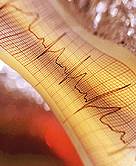Most notable disparities seen for catheter ablation, receipt of oral anticoagulants
WEDNESDAY, July 1, 2015 (HealthDay News) — For patients newly diagnosed with atrial fibrillation (AF), race and sex may affect treatment, according to a study published in the July issue of Heart Rhythm.
Prashant D. Bhave, M.D., from the University of Iowa Hospitals and Clinics in Iowa City, and colleagues used administrative encounter data for Medicare beneficiaries to identify patients with newly diagnosed AF; 517,941 patients met the study criteria (87 percent white, 7 percent black, and 6 percent Hispanic; 41 percent male). The authors catalogued services received after initial AF diagnosis.
The researchers observed statistically significant differences in AF-related service use by race and sex, in multivariate analysis, with white patients and male patients receiving the most care. The most pronounced disparities were observed for catheter ablation (Hispanic versus white: adjusted hazard ratio [aHR], 0.70; female versus male: aHR, 0.65; both P < 0.001) and oral anticoagulation receipt (black versus white: aHR, 0.94; Hispanic versus white: aHR, 0.94; male versus female, aHR, 0.93; all P < 0.001)
“Identifying patterns of disparity and barriers to care at the regional and local level may help to guide community-based interventions,” the authors write. “Strategies to educate patients, change patterns of referral, and improve access to specialist care for women and minorities with AF may help to improve quality of life and cardiovascular outcomes in those patients.”
Copyright © 2015 HealthDay. All rights reserved.








